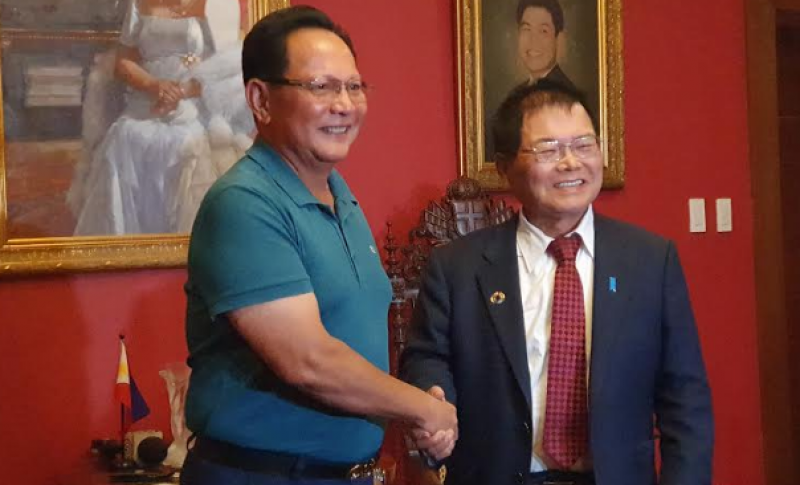Japan and PH partner to make Asia a truly technologically advanced region

Japanese Minister Naokazu Takemoto and Secretary Raul Lambino of CEZA urge Philippine Congress to write laws on security tokens, cryptocurrencies, and other financial technologies.
Naokazu Takemoto, Japanese Minister of State for Science and Technology Policy, visited Manila on January 4, 2020, to meet with Cabinet Secretary Raul Lambino, present administrator and CEO of the Cagayan Economic Zone Authority (CEZA). It is expected that the Payment Services Act and the Financial Instruments and Exchange Act of Japan will be revised in April 2020, and it is in this context that the two officials have met to discuss the future of financial technology businesses in the country and the Asian region, especially those related to cryptocurrencies, blockchain, and a new asset class called “security tokens.”
Security token offerings or STOs are digitalized securities such as stocks, bonds, and equity interests in funds that use blockchain technology as its main platform. As Minister Takemoto explains, “[The word] ‘security’ in STO is not the same as cybersecurity and computer securities. It means ‘securities’ in terms of assets or a way to issue digital securities and raise funds through the blockchain. This digitalization is expected to enable people who could not participate in the investment process to make small-scale investments.”
Over the past two or three years, companies in Europe and the United States have emerged with various businesses providing STO financing and associated blockchain technologies and platforms. Along with this is the creation and implementation of rules and regulations, even laws within their jurisdictions, surrounding the development, use, and exchange of these virtual currencies. Last year, STOs also attracted a lot of attention in Japan, which led five major securities companies including SBI, one of the largest FinTech companies in the country, to establish the Japan STO Association in October 2019.
“STO is now becoming a worldwide funding method of financing, but the STO market in Asia, including Japan, has just begun to develop. To achieve the philosophy of ‘enhancing financial markets and enriching the economy by using technologies to benefit the entire population,’ cooperation between financial systems and technologies among Asia countries is essential and must be considered,” says Minister Takemoto.
Secretary Lambino also echoed this urgent need for a set of rules and regulations or even a law that would help the Philippines become more competitive in this field. In 2017, CEZA launched its “Crypt Valley of Asia” initiative, which aims to provide a stable and safe region for blockchain developers and cryptocurrency exchange operators to domicile their back office support infrastructure. It currently has 25 licensee companies from all over Europe and Asia, including Japanese developer ALLEX, a security token issuer that provides solutions on exchanges including management, settlement, and related operations. Its security token ST20 or the ALLEX token complies with the JP standards of KYC/AML (know your customer/anti-money laundering) that protects the users, investors, and the issuer company from scams and fraud.
Despite being developed in the country, Filipinos unfortunately cannot enjoy using ALLEX or any other security token because of the absence of laws that would allow it. “Congress needs to enact laws surrounding STOs and virtual currencies, and appoint a particular government agency to have jurisdiction to supervise the implementation of this. If not, we, particularly the CEZA, will end up being a mere host for back offices or business processing office (BPO) for foreign fintech companies while all the buying, trading, and offering payments will be done offshore,” Secretary Lambino emphasized.
In the meantime, ALLEX still will play an influential role in helping to train Philippine blockchain developers in how to create security tokens. This Japan-Philippine technology and knowledge transfer is one of the economic benefits of having foreign back office support within CEZA.
Both Lambino and Takemoto are hopeful that the Philippines will follow suit and catch up to other neighboring countries such as South Korea, Singapore, Hong Kong, and of course Japan, which are now actively setting up their rules and regulations for virtual currency exchanges. “This matter is unstoppable. It’s now being practiced and accepted by many jurisdictions, including the US, and this new idea of putting up security tokens, which are asset-backed and completely different from the initial utility tokens, will be, I think, the answer to the problems of scams or fraudulent activities regarding this new dimension of business,” Secretary Lambino adds.
Aside from modernizing the country’s financial landscape, establishing clear-cut rules and regulations on security tokens and cryptocurrencies in the Philippines will also help grow the economy by attracting more investors and providing more jobs for Filipinos.
See also in newspapers:
Japan, CEZA partner to advance financial technology in PH – Malaya Business Insight, January 20, 2020
Japan, PH Join forces to make Asia Technologically Advanced – Manila Standard, January 19, 2020
INVESTMENT OPPORTUNITIES
VISITOR COUNTER






 Users Today : 904
Users Today : 904 Users Yesterday : 1877
Users Yesterday : 1877 This Month : 16297
This Month : 16297 This Year : 64461
This Year : 64461 Total Users : 220346
Total Users : 220346 Views Today : 6095
Views Today : 6095 Total views : 2076813
Total views : 2076813
REPUBLIC OF THE PHILIPPINES
ABOUT GOVPH
Learn more about the Philippine government, its structure, how government works and the people behind it.



